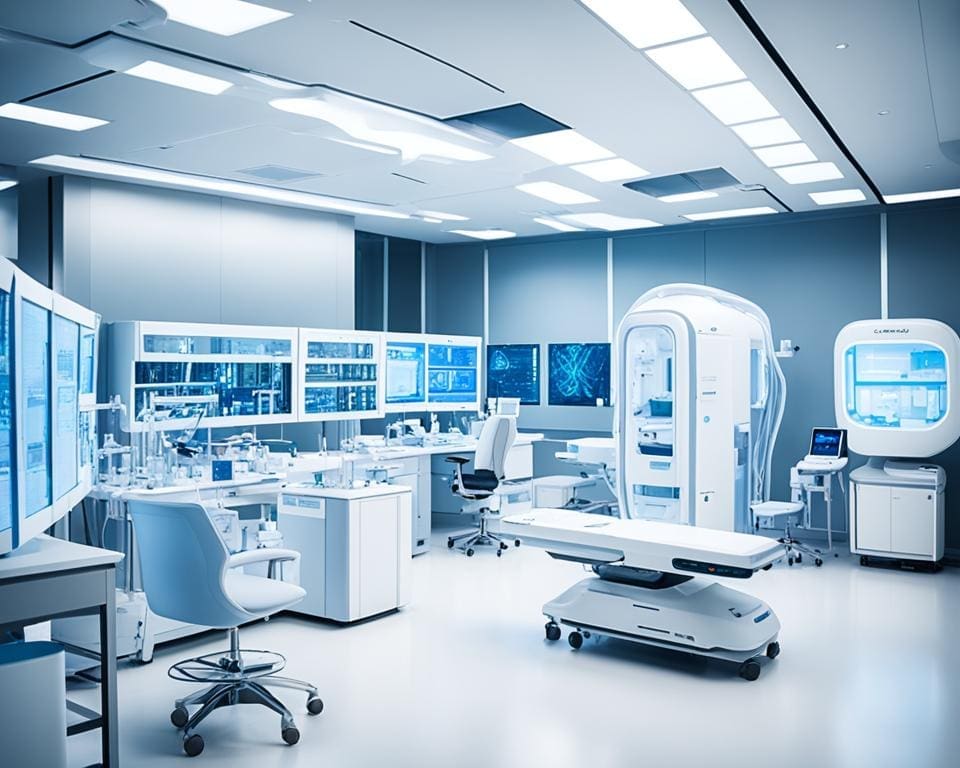Biotechnology stands as a beacon of hope in the realm of modern medicine, revolutionizing the way we tackle health challenges. This vital intersection of biology and technology enables innovative biotechnology applications that significantly enhance patient care. Today, biotechnology in healthcare is not merely an afterthought but a core component driving remarkable advancements in medicine.
The integration of medical innovation in biotechnological practices is transforming diagnostics, treatments, and preventative health strategies. As we uncover the depth of biotechnology’s potential, we see how it reshapes the landscape of healthcare, facilitating the development of new therapies and improving existing practices to deliver better patient outcomes.
The Role of Biotechnology in Modern Medicine
Biotechnology plays a pivotal role in modern medicine through its extensive applications in various healthcare domains. This innovative field focuses on manipulating living organisms and biological systems to develop transformative therapies, diagnostic tools, and medications that enhance patient care and outcomes. The merge of biotech research with medical science fosters advancements that can address some of today’s most pressing health challenges.
Definition and Importance
At its core, biotechnology encompasses the techniques that modify organisms or their components for practical purposes. Its significance in modern medicine advancements is profound, allowing for the rapid development of treatments and devices that revolutionize patient care. The realm of biotechnology applications is expansive, ranging from drug discovery to vaccine development. A notable example is the swift creation of COVID-19 vaccines, which highlighted biotechnology’s ability to respond quickly to global health needs. Through this mechanism, biotechnology not only provides solutions but also enhances overall healthcare advancements.
Key Areas of Impact
The impact of biotechnology in medicine spans several key areas:
- Diagnostics: Biotechnology applications in biomarker discovery and molecular technologies have significantly improved disease detection, leading to earlier and more accurate diagnoses.
- Therapeutics: Innovations like monoclonal antibodies and gene therapy represent breakthroughs in targeted treatment options, directly addressing various medical conditions with precision.
- Biomanufacturing: Processes in this area allow the large-scale production of intricate biological products, ensuring their availability in the market.
- Regenerative Medicine: Advances in stem cell technology enhance the ability to repair or replace damaged tissues, offering hope for previously untreatable conditions.
With each of these areas, the integration of biotechnology into healthcare marks a significant step towards medical innovation, promising a future where previously insurmountable health issues may finally be resolved.

Biotechnology: Advancements in Medicine
In recent years, the field of biotechnology has made significant strides in medical innovation, fundamentally reshaping how we approach diagnostics and treatments. With a focus on delivering precision and efficacy, biotechnology in healthcare is leading the way in enhancing patient outcomes. This section delves into two pivotal areas where these advancements are making profound impacts.
Revolutionizing Diagnostics
Advancements in medicine have enabled remarkable changes in diagnostic methods. Techniques such as polymerase chain reaction (PCR) and next-generation sequencing (NGS) facilitate rapid, accurate disease detection, allowing medical professionals to swiftly identify pathogens, genetic mutations, and vital biomarkers. These innovations empower healthcare providers to implement early interventions and craft personalized treatment plans tailored to individual patients. Industry leaders like Illumina and Thermo Fisher Scientific exemplify how biotech breakthroughs in diagnostics are reshaping patient management and significantly improving healthcare outcomes.
Transformative Therapies and Treatments
The transformative therapies emerging from biotechnology are revolutionizing patient care and changing the narrative for those suffering from chronic or life-altering conditions. Breakthroughs such as CAR T-cell therapy highlight how gene and cell therapies offer hope in treating cancers and genetic disorders that previously had limited options. By harnessing the body’s own immune response, these medical technologies are paving the way for more effective treatments where traditional methods have often fallen short. Companies like Novartis and Gilead Sciences are at the forefront of this revolution, showcasing how transformative therapies derived from biologics are providing novel solutions for autoimmune diseases and rare genetic conditions, ultimately enhancing the quality of life for countless patients.








